ISS TODAY
Settling local disputes is key to peace in Central Mali

Restoring state authority isn’t enough to stabilise the region – local grievances and rights must be attended to. By Boubacar Sangaré
First published by ISS Today
On 15 October, 11 civilians were killed by assailants on a motorcycle in Telly in Central Mali’s Mopti region. This attack occurred barely two days after Prime Minister Soumeylou Boubèye Maïga, visited the district to affirm the return of the state to this region.
Growing insecurity since 2012 had led to the withdrawal of some state agents (such as local administrators and judges) from the area. Instability increased, with community-based militias – including for example traditional Dogon and Bambara hunters – emerging in self-defence.
Since 2016, more than 12,000 people have been displaced, 287 civilians killed and 67 kidnapped, and 685 schools closed in Central Mali, especially the Mopti region. The upsurge of inter-community conflicts between the Fulani herders and the Dogon and Bambara farmers, intra-community conflicts among the Fulani, and attacks by violent extremist groups have all contributed to the rising instability.
The dynamics of the conflict in this region are multidimensional, rooted in successive droughts and state-promoted development policies. Structural factors linked to the disruption of agriculture, livestock farming and fishing following drought in the 1970s and 1980s destabilised production systems, the bedrock of socio-economic relations between the different communities.
Most conflicts are concentrated in the central delta of the Niger River, in districts such as Djenné, Mopti, Tenenkou and Youwarou, and the Dogon Plateau where agro-pastoral resources are central to the economy. The pressure on arable land, due to the combination of climatic factors and the emphasis on state-supported agriculture backed by Mali’s international partners, has affected Fulani pastoralists, making access to land a source of tension.
Conflicts between Delta herders and Dogon Plateau farmers revolve around, among other things, the occupation of cattle trails by farmers and disagreements over agricultural and transhumance calendars – that is, the seasonal movement of livestock for grazing. In 2012, hunters claiming to belong to the Dogon community killed over 20 Fula people, burnt 350 hamlets and carried away livestock following a conflict over an animal corridor between Koro and the Burkina Faso border.
Most of these conflicts had previously been settled through community-based mechanisms, including traditional authorities. These mechanisms are now strained following tensions between communities and traditional authorities such as Dioros (pasture managers), whom they accuse of paying state authorities to win disputes.
The conflicts are also becoming more complex, exploited by both militias and violent extremist groups. Another issue is that in some villages, chiefs are not traditional chiefs – they have been placed there by the administration.
When extremist groups occupied the northern part of the Mopti region in 2012, arms became more accessible to warring communities, and violence in the region increased. Violent extremists exploit communities’ dissatisfaction with state actors such as judges, gendarmes and water and forestry agents, whom communities accuse of corruption.
Attempts to ease tensions between the Central Mali communities date back to 2016. The government’s Mission to Support National Reconciliation, established in April 2017, has travelled to the Dogon areas and some areas of the Central Delta to meet with the communities.
Mediation by non-governmental organisations, some mandated by the government, led to a unilateral ceasefire agreement in early July 2018 – but this wasn’t endorsed by the Dogon militia, Dana Amassagou, which is also fractured. As a result the conflict between the Dogon and Fulani militia has continued.
On 28 August 2018, 34 traditional leaders of Fulani and Dogon villages signed an inter-community peace accord in Sévaré to end the conflict between them. The mediation has however failed to take root because of intensifying violence.
The agreement highlights many of the pitfalls of the various peace processes in Mali in recent years. First, it shows the problem of the inability of signatories, in this case village chiefs, to influence the peace process on the ground. Second, while the process gained support in Dana Amassagou when its military commander Youssouf Toloba, and the Dogon cultural association Ginna Dogon, got on board, it doesn’t include the predominantly Fulani militias.
Third, the Fulani cultural association Tabital Pulaaku has denounced the agreement. They believe Toloba and his accomplices should be tried at the International Criminal Court. The government seeks to integrate some militias through a disarmament, demobilisation and reintegration process that doesn’t leave much room for victims to pursue justice and reconciliation. This disagreement is hampering the peace process.
Mali’s government designed the Integrated Regional Security Plan for Central Mali to secure the country’s central regions. But military operations have instead led to more conflict between the army and the population, who accuse the army of various abuses.
The Fulani especially suffer at the hands of the army as they are suspected of siding with the jihadists. Several human rights organisations accuse the army of violations under the guise of fighting terrorism.
Mali’s Ministry of Defence has acknowledged the army’s involvement in mass graves in localities near Mopti. The army had arrested people in these areas, and then released those who weren’t Fulani. The Fulani were killed.
Peace in Mali requires a shift from the current narrow approach of state dialogues with willing armed groups to a broader and more inclusive national dialogue. This would lay the foundation for agreement on common principles for a new social contract between the state and society.
Current debates on the return of state authority must include the type of state that the people of Mali can relate to and accept – which would no doubt be one that shows more respect for their rights. DM
Boubacar Sangaré is a Junior Fellow, ISS Bamako














 Become an Insider
Become an Insider